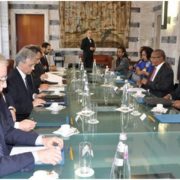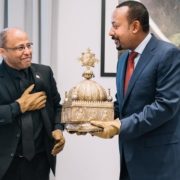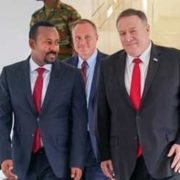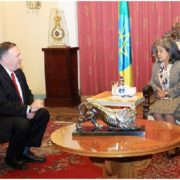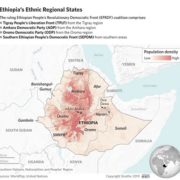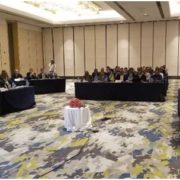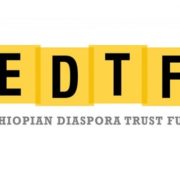By
Lawrence Freeman
Prime
Minister Abiy Ahmed has embarked on a bold effort to transform the political
terrain of Ethiopia while simultaneously launching new economic reforms. The
creation of the new Ethiopian Prosperity Party (PP) replaces the Ethiopian
People Revolutionary Democratic Front-(EPRDF), founded in 1988. Dissolving the
reigning EPRDF and fashioning a new national party, or what some refer to as a
Pan-Ethiopian party, is a courageous and daring move, essential for Ethiopia’s
future. This emerging nation of over 105 million people, already a leader
in economic development, is now embarking on a challenging path to create de
novo a national party.
The
EPRDF, which had governed Ethiopia since May 1991, was composed of four
Regional States, plus the cities of Addis Ababa (the capital), and Dire Dawa.
The four regional parties are: the Tigray People’s Liberation Front-(TPLF); the
Oromo People’s Democratic Organization-(OPDO) (renamed early this year as Oromo
Democratic Party-(ODP); the Amhara National Democratic Movement-(ANDM),
(renamed early this year as Amhara Democratic Party-(ADP); and the Southern
Ethiopian People’s Democratic Movement-(SEPDM), (a coalition of the 56 ethnic
groups).
The
EPRDF was fashioned to address Ethiopia’s earlier history of dictatorial and
monarchical rule. The designers of the governing party believed that
acknowledging ethnic identity, which was not recognized for centuries, would
solve the tensions of that time. Recent conflicts in Ethiopia have shown this
arrangement to be ineffective.
Of the
four parties that comprised the EPRDF, only the TPLF has refused to join the
new PP. Already the governing parties representing 5 regions, which were
not members of the EPRDF, but were recognized as allies of the EPRDF have
joined the PP in preparation for May 2020 elections. They are: 1) Afar National
Democratic Party (ANDP); 2) Benishangul-Gumuz Democratic Party (BDP); 3) Somali
Democratic Party (SDP); 4) Gambela People’s Democratic Movement (GPDM); and 5)
Harari National League (HNL). The PP will be inclusive, intending to represent
all communities, inviting Tigrayans, who live in and outside the region to
join. The PP program will have Amharic as its working language as per the
constitution. However, Afan Oromo, Tigrigna, Somali and Afar will also be the
working languages of the new PP.
Prime
Minister Abiy’s founding of the PP on December 1, just six months before
Ethiopia’s national elections, is fraught with personal risks for the new Prime
Minister. However, this endeavor is bursting with the potential to transform
politics and social relations in Ethiopian society. Ethiopia has a splendid
history thousands of years old, rich with a multiplicity of cultural
backgrounds. The PP is intended to harmonize the diversity of the nation with a
national non-ethnic based
party.
Chair Persons of the
eight parties who also represent eight Regions as governing parties worked
under the umbrella of the EPRDF coalition signed a document for the
establishment of Prosperity Party. Photo Credit OPM
Nationalism: Not Ethnic Nationalism
A
sovereign nation-state is not a
mosaic of diverse groups competing with each other for control of the
government or pursuing administration posts to obtain economic and financial
rewards. A sovereign nation should have a national identity and a mission
orientation for its people; all its people, regardless of ethnic heritage.
Contributing to the distinctive identity of Ethiopia was its military defeat of
the Italian Empire in the battle of Adwa on March 1, 1896. Consequently, this
victory, uniquely allowed Ethiopia to remain free from colonialism. Although
this triumph occurred over one century ago, it is part of the psychological
composition of the identity of all Ethiopians; whether they are conscious of
its effects or not. Ethiopia’s decades’ long determination to develop from a
disadvantaged nation to an aspiring lower middle-income nation with nascent
light manufacturing industry is another feature of Ethiopia’s national
identity.
Professed
ethnonationalism errs in that it attempts to substitute the demands, often for
legitimate needs, of one particular group above the interests of all the
citizens. A nation-state cannot survive in a Hobbesian war of all against each
other to obtain the most goodies for “my people.” Dare we forget the horrors of
the ethnically driven tragic Biafran war in Nigeria from 1967-1970, and how
geographic-ethnic distinctions have determined every unhealthy aspect of
political and social life in Nigeria today?
Recriminations
from the past are no excuse for actions today. Decisions concerning the best
strategy for securing the future of Ethiopia must be based on how that policy
will benefit the well-being of all citizens.
Medemer and Synergy
In his
acceptance speech for the 2019 Nobel Peace Prize winner, Prime Minister Abiy
spoke of the philosophy of the Medemer.
He
said: “Medemer, an Amharic word, signifies synergy, convergence, and teamwork
for a common destiny. Medemer is a homegrown idea that is reflected in our
political, social, and economic life. I’d like to think of ‘Medemer’ as a
social compact for Ethiopians to build a just, egalitarian, democratic, and
humane society by pulling together our resources for our collective survival
and prosperity…At its core, Medemer is a covenant of peace that seeks unity in
our common humanity.” One could appropriately, add for the “common good”
of humankind.
Our
“common humanity” exists in all of us. We are all born in the image of the
Creator. All human beings are universally related by our endowed powers of
creative mentation, more commonly known as reason. What distinguishes all human
beings from the animal species is our mental power to discover new scientific
and cultural principles embedded in our universe. All of us homo sapiens,
regardless of where we were born, or any physical characteristics, are
substantially more alike than we are different. Therefore, our needs,
desires, and aspirations in life are similar. All human beings not only share a
common interest to enhance our lives, but we also share a desire for a better
future for our posterity. There is no class of superior people, who have more
rights than others due to privileges of birth, religion, or skin color. Each of
us are placed here on earth to contribute to the common good of our common
humanity using our individual talents.
If we
accept synergy to mean cooperation and collaboration to achieve an enhanced
effect, then let us act synergistically to ensure a prosperous Ethiopia that
provides for all its citizens.
The Constitution and Sidama
Inherent
problems of the 1995 Constitution of the Federal Democratic Republic of
Ethiopia are evident in the November 2019 referendum conferring autonomy to
Sidama. Ethiopia’s constitution stipulates that with this lawful vote, the
people of Sidama, the fifth largest ethnic group, will become the tenth ethnic
regional state. Eight of the existing nine regional states are governed by the
dominant ethnic group of that geographical region. However, the Sidama people
reside in Southern Nations, Nationalities, and People’s Region–(SNNPR), where
many other small ethnic groups (around 56) also exist.
The Preamble of Ethiopia’s Constitution properly
emphasizes the conception of a united nation with a common purpose and goal for
all its people. It deliberates on “advancing our economic and
social development,” “common interest….and the emergence of a common outlook,”
and “to live as one economic community.” Article
14 resonates with the US Constitution, stating: “Every person
has the inviolable right to life the security of person and liberty.” The same
principle is echoed in Article 43 of
the Constitution: The Right to
Development. “The basic aim of development activities shall be to enhance the
capacity of citizens for development and to meet their basic needs.”
The
drawback to the Constitution begins in Article
8:Sovereignty of the People, where
sovereign powers are divided up between “Nations, Nationalities and Peoples of
Ethiopia.” This is an obvious compromise to ethnicity. In truth; there is
only one Ethiopian
people and only one Ethiopian
nation. The divisions in Ethiopian society are made explicit in Article39: “Every Nation, Nationality and People in
Ethiopia has an unconditional right to self-determination, including the right
of secession……the right to a full measure of self-government…” This separation
of Ethiopians into multiple groups, outlined in the Constitution, is the seed
for the tensions gripping Ethiopia today.
In the
aftermath of the Sidama referendum, Ethiopia potentially faces a conundrum.
Will other ethnic minorities now choose to follow the same path as Sidama in
calling for autonomy as delineated in the Constitution? It appears so. In
addition to Sidama Zone*, which is now claiming to be the 10th state,
there are other Zones in the Southern Region that want to follow the same route
to statehood. To quote William Shakespeare, “there’s the rub.” Clearly the
Ethiopian Constitution, despite the best intentions, has proven to be
unsuccessful in governing this multi-ethnic nation.
The Challenging Course Ahead
The
emergence of a national party such as the PP can commence the process of
uniting the nation by moving away from a society where ethnic interests are
placed above the welfare of the nation. Ultimately the problematic features of
the Ethiopian Constitution will have to be revisited. Not to address this
thorny issue will allow instigators to use ethnicity to disrupt what is most
necessary for Ethiopia to move forward; a healthy process of dialogue and
debate on the future of Ethiopia.
This
discourse should include a discussion by the Ethiopian people on changing the
structure of ethnic-based parties. For example, Ghana’s Constitution stipulates
that “Every political party shall have a national character, and membership
shall not be based on ethnic, religious, regional or other sectional
divisions.” That no political party shall be formed “(a) on ethnic, gender,
religion regional, professional or other sectional divisions; or (b) which uses
words, slogans or symbols which could arouse ethnic, gender, religious,
regional professional or other sectional divisions.”
The
lack of vibrant Ethiopian nationalism creates
a fertile environment for those who want to manipulate misplaced ethnic
passions. The danger presents itself during times of social or economic stress,
when the population’s frustrations can be channeled along ethnic fault lines,
manipulating Ethiopians to act against their true self-interest: progress for
the nation of Ethiopia. Opportunistic ringleaders will attempt to misdirect the
population against each other via competing ethnicities, instead of uniting
society behind a national policy. A policy of economic growth that includes a
strategy to generate employment opportunities for the millions of youth
preparing to enter the workforce is in the vital interests of all citizens.
Of
course, it will take time for people to shed their desire to control policy
making through ethnic-based parties. It is an existential moment for Ethiopia,
and a national grounded PP is a needed first step. It should be
understood, that a sovereign nation, whose national mission is to promote the
general welfare of its people does not require the elimination of historical
cultures. On the contrary, the uniqueness and beauty of each ethnic culture can
be synergistically woven into an elevated national character that transcends
ethnicity.
*Zone
is the middle tire next to the regional state in the governing structure that
is also formed under ethnic lines the Southern Nations, Nationalities, and
People’s Region (SNNPR).
Lawrence Freeman is a
Political-Economic Analyst for Africa, who has been involved in the economic
development policy of Africa for 30 years. He is the creator of the blog:
lawrencefreemanafricaandtheworld.com


